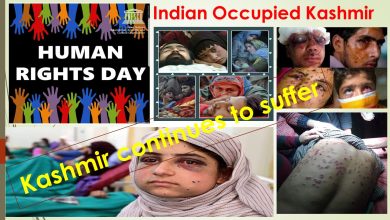 In election or applied politics, there is no permanent friend or foe. The interests are only supreme; however, freedom movement relies upon the chemistry of two constituencies only, i.e. Status quo forces and Anti-status quo ones. It is why freedom fighters refrain from any and every exercise having tendency to cement the status quo.
In election or applied politics, there is no permanent friend or foe. The interests are only supreme; however, freedom movement relies upon the chemistry of two constituencies only, i.e. Status quo forces and Anti-status quo ones. It is why freedom fighters refrain from any and every exercise having tendency to cement the status quo.
One needs to understand that military control is screwed every day in IIOJK; Why New Delhi wants to give military control the democratic colour is an essence which Kashmiris need to understand. Any sort of democratic exercise, either local, Assembly or parliamentary in IIOJK, is all by the design; New Delhi plays shorts on the currency of military control, never the mass base. The Emma Goldman quote defines the Kashmir case: “If the vote changed anything, they would make it illegal.” Therefore, it is legal only for constituencies that oxygen the status quo.
The 11th assembly elections in Kashmir, under the Indian military occupation, are in play after 2014. This selection process is nothing new, neither for the freedom lovers nor for the allied freedom camp, as true patriots know the result of the 1987 elections, which changed trajectory from ballot to bullet. MUF was renamed APHC, and the main reason was the 1987 election robbery in daylight.
Now, the political engineering of 90 seats, of which 43 are for the Jammu region, 47 for the Kashmir region, and seats reserved for the scheduled casts, are in play. Ladakh has already been detached from the state map. The pro-Indian camp NC had fielded 50 in a coalition with the congress and BJP 51 seats, primarily focusing on the Jammu region. PDP is contesting 40 seats. The newly elected leader from South Kashmir, Engineer Rasheed’s AIP, fielded 35 candidates. In post 5th August, New Delhi directly controls elections. Neither state, statehood, nor legislative powers for the coming CM are intact despite the hype; therefore, none has any election manifesto. The pro-Indian parties have nothing to sell. The result is the same as in 2014, so whoever triumphs the elections will make the government with any central party, and the BJP is in quo; therefore, the result will be identical in both cases.
What is curious about this process is that the 1987 elections were testimony for contesting candidates vis-à-vis Indian policymakers and drivers. Still, India is adamant about practising the conventional method and expecting different results. The fielded candidates depict none have even tried to contest the sufficient seats required to form the government with a simple majority; therefore, the coalition is a compulsion, while the result is already declared. Legislation to bestow democratic rights to Kashmir is not a problem. Rather, India is an over-legislated state. However, implementation is? The rules, regulations, and constitutional guarantees for Indians are restricted; however, the implementation and interpretation of India vary in Kashmir; it demands clarity so it may be seen and dealt with.
India baptised its nuclear weapons as the smiling face of Budha is the best example to elucidate how the Indian state behaves and how serious she is about covering her designs and strategic meaning; therefore, in realpolitik, what is on the surface is not the clue what the Indian state intends to do. India is a master in practising the Chanakya political philosophy of classical realism, Saam, Daam, Dand, and Baid. It is interesting to experience that the Indian Constitution Article 19 grants constitutional guarantees: 1) Freedom of speech and expression, 2) The freedom to assemble and move freely without arms. 3) Freedom to form associations and unions. Article 326 further corroborates the role of the Assembly based on adult suffrage, which is at par with universal suffrage, but in practice, it is restricted suffrage in Kashmir. The world and sane democracy-loving nations need to understand that the authorities, institutions, and actors who matter in geo-strategy and geopolitics shall probe what is being written and said in public entirely varies in practice. This is a big gap that demands further empirical investigation. Indian constitutional position is at par with the Magna Carta and UHRD, which Kashmiris demand, but it is selective, restrictive and does not apply in Kashmir.
Democracy or the people’s participation is the make-up proved in 10 Assembly and 12 parliamentary elections as the author of this article was part of 1987 elections; therefore, based on the primary data and eyewitness. The ethnographic study is based on the induction module. The result cannot be different if the actors, policy, modus operandi and module are the same. India will bank upon the percentage of the participants on the polling day as a tactical gain. Still, in practice, the outcome of the 1987 elections is testimony that elections are not the substitute for the right to self-determination, as clearly mentioned in UN resolution # 122 passed in 1951 when the total mandate was given to Sheikh Abdulah for just two years to endorse the accession by constituent Assembly. He was used through 1953 and released in 1971 when he was 72 years old. The best lesson for the pawns, cronies and stepneys is the outcome of the 13 parliamentary and 11 assembly election data net outcomes; therefore, the result of the 12th Assembly election is the same. It will be coalition and unstable. However, New Delhi’s pressing interest highlights the percentage of election participation despite the majority thinking participation is not compromise but the compulsion to run day-to-day affairs. However, India will use the democratic shelter to continue the legal coverage of the AFSPA. PSA and NIA to continue the use of political & lethal weapons against Kashmiris who demand the right to self-determination.








